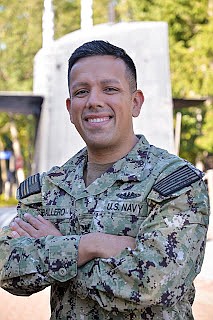Houston Native Serves as a Member of U.S. Navy’s “Silent Service”
Style Magazine Newswire | 10/22/2021, 3:59 p.m.
By Alvin Plexico, Navy Office of Community Outreach
A Houston, Texas, native is serving aboard USS Nevada, one of the world’s most advanced nuclear-powered submarines.
Petty Officer 1st Class Roel Caballero serves as a culinary specialist and joined the Navy to find a new way of life.
"I was a young father and learned some tough lessons very quickly," said Caballero. “The military definitely changed me for the better. I would not be who I am if I hadn't joined the Navy.”
Caballero attended Chavez High School and graduated in 2007. Today, Caballero uses skills and values similar to those found in Houston.
“Growing up, I learned that some people are not worth the frustration, so don't let them get the best of you,” said Caballero.
These lessons have helped Caballero while serving aboard USS Nevada.
Known as America’s “Silent Service,” the Navy’s submarine force operates a large fleet of technically advanced vessels. These submarines are capable of conducting rapid defensive and offensive operations around the world, in furtherance of U.S. national security.
There are three basic types of submarines: fast-attack submarines (SSN), ballistic-missile submarines (SSBN) and guided-missile submarines (SSGN).
Fast-attack submarines are designed to hunt down and destroy enemy submarines and surface ships; strike targets ashore with cruise missiles; carry and deliver Navy SEALs; conduct intelligence, surveillance, and reconnaissance missions; and engage in mine warfare.
The Navy's ballistic-missile submarines, often referred to as "boomers," serve as a strategic deterrent by providing an undetectable platform for submarine-launched ballistic missiles. SSBNs are designed specifically for stealth, extended patrols and the precise delivery of missiles.
Guided-missile submarines provide the Navy with unprecedented strike and special operation mission capabilities from a stealthy, clandestine platform. Each SSGN is capable of carrying 154 Tomahawk cruise missiles, plus a complement of heavyweight torpedoes to be fired through four torpedo tubes. As a member of the submarine force, Caballero is part of a rich 121-year history of the U.S. Navy’s most versatile weapons platform, capable of taking the fight to the enemy in the defense of America and its allies.
Serving in the Navy means Caballero is part of a team that is taking on new importance in America’s focus on rebuilding military readiness, strengthening alliances and reforming business practices in support of the National Defense Strategy.
“It's important to stay ready,” said Caballero. "We have to be prepared for whatever mission we get and whatever job we have."
With more than 90 percent of all trade traveling by sea, and 95 percent of the world’s international phone and internet traffic carried through underwater fiber optic, Navy officials continue to emphasize that the prosperity and security of the United States is directly linked to a strong and ready Navy.
Strategic deterrence is the nation’s ultimate insurance program, and for decades Naval Submarine Base Bangor has been home to Ohio Class ballistic-missile submarines. Beginning in 2028, the new Columbia Class ballistic-missile submarines will arrive and provide continuous sea-based strategic deterrence into the 2080s.
Caballero and other sailors have many opportunities to achieve accomplishments during their military service. Caballero is most proud of leading a team of Navy culinary specialists to Kitsap High School.
“It was very rewarding, and my sailors earned a volunteer service ribbon for their work,” said Caballero. “The great part was that the guys weren't even expecting an award. They just wanted to be part of the program and to help others."
As Caballero and other sailors continue to train and perform the missions to support national defense, they take pride in serving their country in the United States Navy.
“It's a privilege to be in the Navy,” added Caballero. "Not only what I've been able to do, but also how I can provide for my family and the way my family looks at me.”




